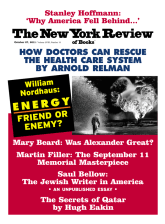In response to:
The Court: A Talk with Judge Richard Posner from the September 29, 2011 issue
To the Editors:
Judge Richard Posner speculates about the extent to which Supreme Court justices are moved by principle relative to politics [“The Court: A Talk with Judge Richard Posner,” NYR, September 29]. He says:
It is interesting what he [Justice Scalia] said in the oral argument in the McDonald case [in which Scalia joined in a decision holding that the Second Amendment applies to the states and thus confers a constitutional right to keep and bear arms]…. He said that that even if hundreds of people die as a result of his interpretation of the Second Amendment, that would be irrelevant to the correctness of the decision.
It is also interesting that just two years before that decision Justice Scalia wrote in a dissent in Boumedienne v. Bush, the case that held (wrongly, I believe) that foreign fighters held in Guantánamo had a constitutional right to petition US courts for habeas corpus to determine the legality of that detention:
Today, for the first time in our Nation’s history, the Court confers a constitutional right to habeas corpus on alien enemies detained abroad by our military forces in the course of an ongoing war…. Our Armed Forces are now in the field against the enemy, in Afghanistan and Iraq. Last week, 13 of our countrymen in arms were killed. The game of bait-and-switch that today’s opinion plays upon the Nation’s Commander in Chief will make the war harder on us. It will almost certainly cause more Americans to be killed….
The Court in that case too relied—in my judgment to a ludicrous extent—on distant historical precedents, and Scalia said that given the uncertainty of the history the Court should defer to the judgment of the legislature. The Court in the Second Amendment cases also relied on highly controverted historical arguments to reach a wrong and harmful conclusion, but Justice Scalia did not there urge deference to the legislature.
On a personal note, I am of course grateful to Judge Posner for the kind things he says in that article about my tenure on the Massachusetts Supreme Judicial Court. But I left that court to return to Harvard not at age sixty-seven but at age sixty-four. Three years may not seem like a long time in the grand scheme of things, but it seemed like an awfully long time then and does now.
Charles Fried
Beneficial Professor of Law
Harvard Law School
Cambridge, Massachusetts



